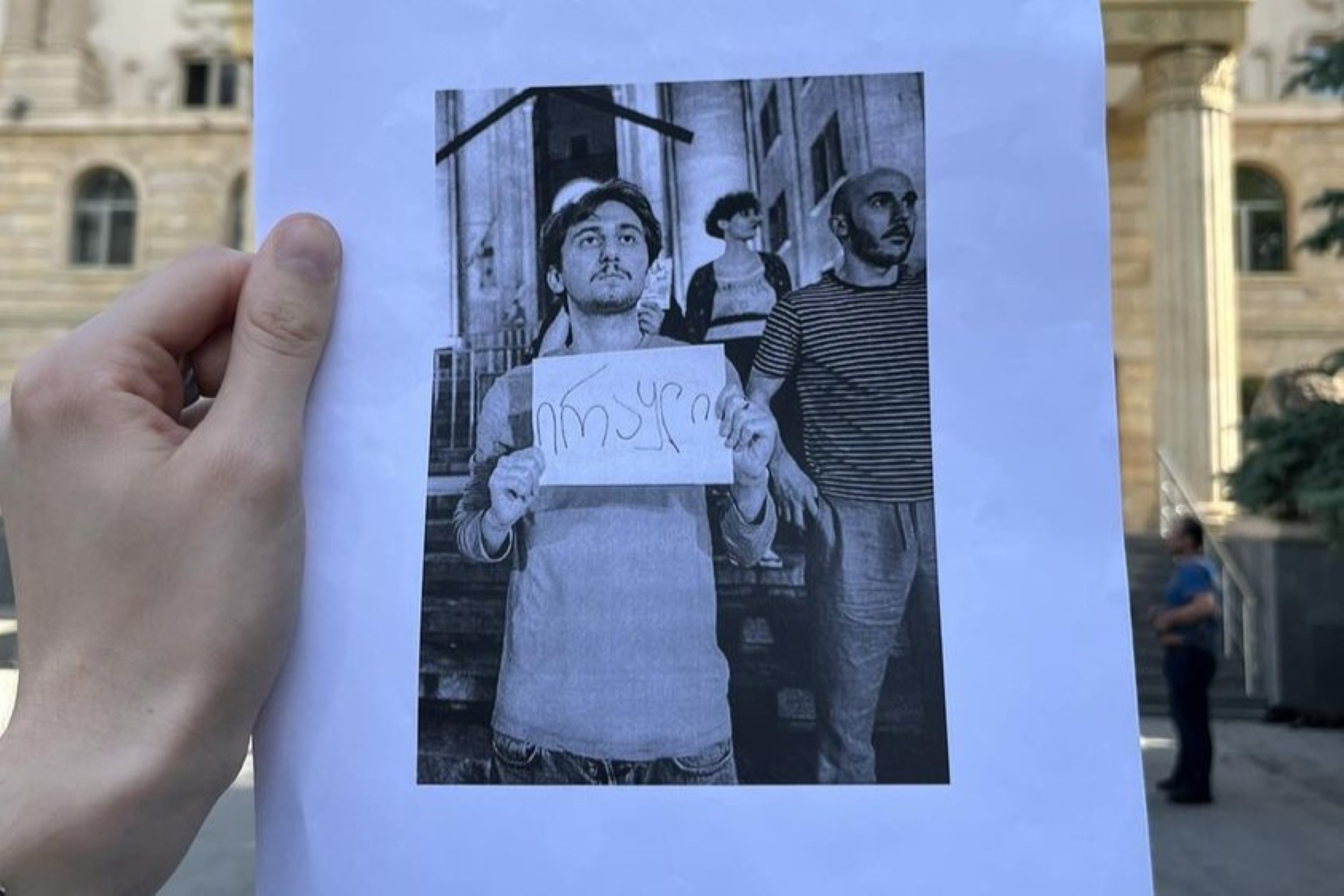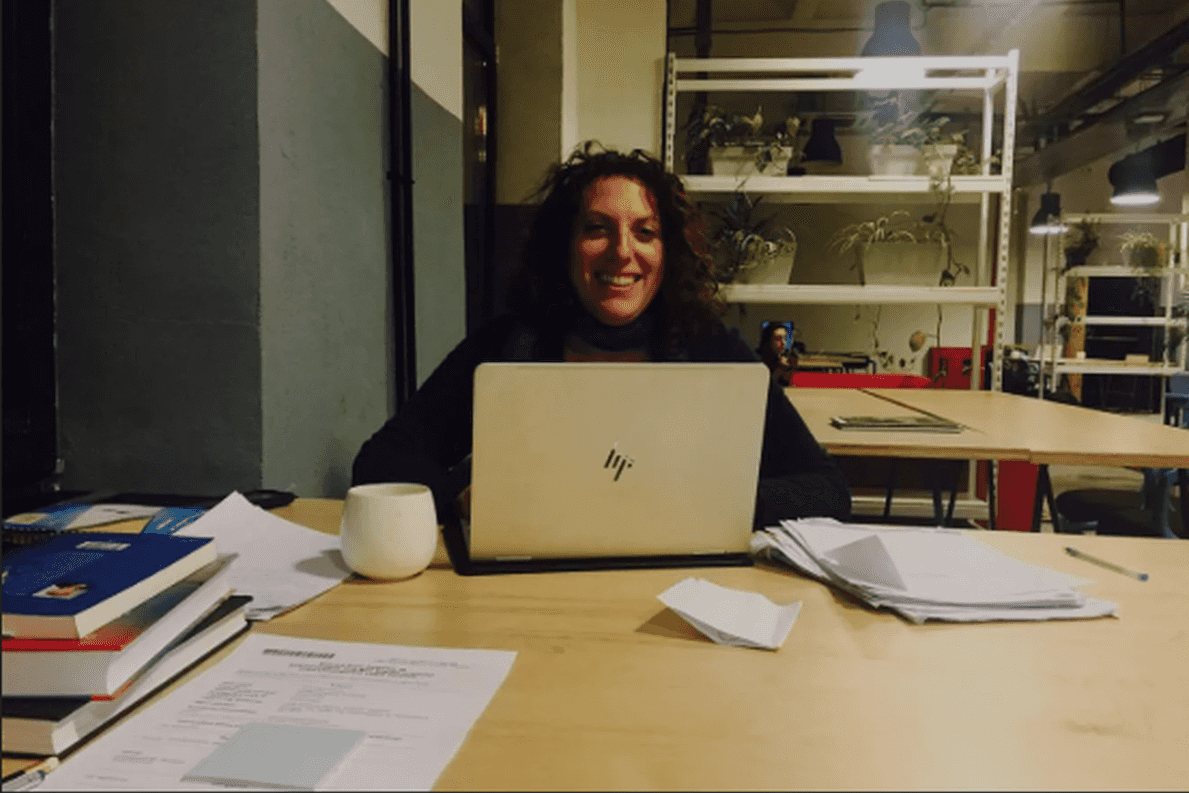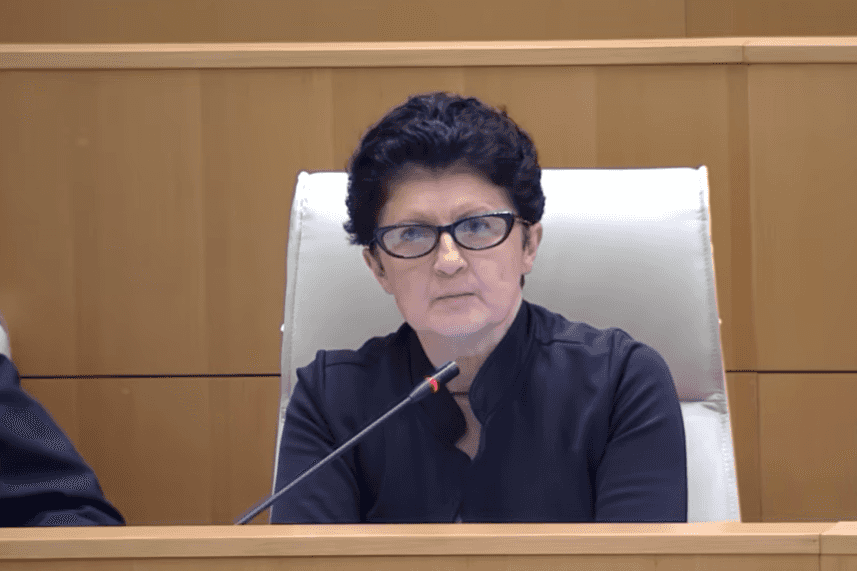
A Georgian activist is on trial on charges of hooliganism and disobeying the police after holding a blank sheet of paper at a peaceful protest in Tbilisi.
Eduard Marikashvili, who chairs the Georgian Democracy Initiative (GDI), was detained along with seven others on 2 June.
Activists Nika Romanadze and Saba Brachveli, who held posters insulting Prime Minister Irakli Gharibashvili at the demonstration, also face the same charges.
The arrests took place at a small, peaceful protest in front of the parliament building in Tbilisi, which was calling on the authorities to respect the right to freedom of expression and assembly.
The protest, organised by Georgian anti-government group GEUT (‘stubborn’), followed a number of incidents in the previous days in which police confiscated or damaged protesters’ posters, many of which criticised recent anti-Western comments by the prime minister.
Of the seven arrested, one held a copy of the Georgian constitution, another a blank sheet of paper, and others posters on which the first name of Prime Minister Irakli Gharibashvili was written with the letter ‘K’ (‘კ’) swapped for the letter ‘ყ’ — a K sound made in the back of the throat — so as to resemble the Georgian word for ‘dick’. Police widely targeted such banners at protests in the previous days.
[Read on OC Media: Georgian activists arrested over protest signs released without charge]
While the detained protesters were released on 4 June with no charges at the time, trial hearings were announced around midday on 6 June for the same day, and rescheduled later that afternoon; Saba Brachveli for 16 June, Nika Romanadze for 27 June, and Eduard Marikashvili, 28 June.
Their cases, the latest in a growing number of administrative charges pressed against peaceful protesters in recent years, represent a dramatic limitation of the right to protest in Georgia.

Saba Brachveli stated on Tuesday that he and his lawyers only found out that the trial had been postponed after having prepared for his hearing, which had been scheduled for Tuesday afternoon.
He added that while he was accused of swearing and disobeying a ‘legal request’ by a police officer, he had not sworn and the police officer’s request was not legal, as he had ‘the absolute right’ to hold a poster.
While Marikashvili’s case began on Tuesday, it was postponed after his lawyers filed a motion to disqualify judge Nino Shcherbakovi, who suggested that the burden of proof was on ‘both sides’ — the police and the defence.
The judge denied this motion.
‘Offensive’ banners and violent arrests
In the days prior to 2 June, police confiscated and damaged protesters’ posters at several nightly anti-government protests organised by GEUT.
At the protest on 2 June, police once again confiscated signs, going on to violently detain seven protesters and injure three others. Police repeatedly justified their actions by stating that the demonstrators’ banners were ‘offensive’, despite multiple protesters carrying blank sheets of paper.
Police got very violent now
Once again they say posters are insulting. pic.twitter.com/kWy3RdoczL— Mariam Nikuradze (@mari_nikuradze) June 2, 2023
Some of those detained were taken by law enforcement officers to detention centres outside of Tbilisi, where they were held for 48 hours.
Vano Chitashvili of Transparency International Georgia, a lawyer defending Romanadze, Brachveli, and Marikashvili, stated that their 48-hour pre-trial was unjustified and consequently illegal.
On Tuesday, Prime Minister Irakli Gharibashvili called the activists and their supporters ‘oppositionists’ and described their actions as ‘simple provocations’, while speaking to journalists.
‘Our weak and marginalised opposition, with all its satellites, NGOs, and degraded, immoral people, has nothing left but to resort to personal insults’, he said.
When asked by a journalist if he was offended by the pun on his name that protesters had been using, Gharibashvili responded by stating that he couldn’t care less.
‘These are ordinary, simple provocations on which a serious person cannot have a serious comment’, he said.
The Georgian courts have previously convicted peaceful protesters on administrative charges.
On 23 February 2021, Nodar Rukhadze, an activist of the anti-government group Shame Movement, was arrested for shouting anti-government slogans through a megaphone outside parliament. Rukhadze was fined ₾2,000 ($600 at the time).
[Read on OC Media: Georgian activist arrested ‘for shouting anti-government slogans’]
On 15 December 2022, the European Court of Human Rights ruled against the Georgian government, upholding the right to hold insulting posters at political protests.
The case concerned a 2015 demonstration against the construction of the Panorama Tbilisi complex on Freedom Square. Seven activists were arrested by the police after approaching Tbilisi City Hall holding signs with the inscription ‘No [to] Panorama, dick’.
The court found that there had been a violation of the right to assembly, taking into account freedom of expression, and ordered the state to pay compensation to the activists.







